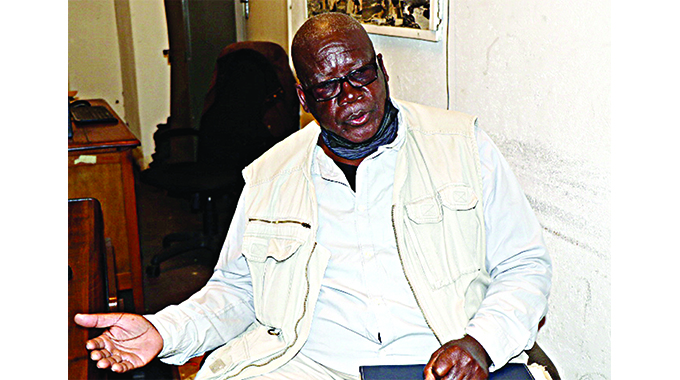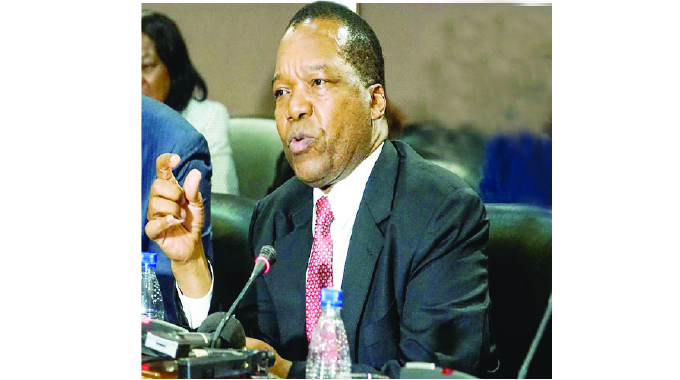From Rhodesian police officer to freedom fighter

Mashudu Netsianda, Senior Reporter
THE famous 1967 Wankie Campaign, a military pact between Zimbabwe People’s Revolutionary Army (ZPRA) and Umkhonto We Sizwe during the liberation struggle, inspired veteran freedom fighter, Cde Zephaniah Moyo to join the armed struggle.
Cde Moyo whose pseudo name was Cde Jeckonia Zulu, deliberately joined the British South African Police (BSAP) in 1969 to acquire the much-needed expertise on intelligence, which turned out to be his weapon against the repressive colonial regime.
He resigned from the colonial police force in 1976 and joined the war.
It was through the intelligence skills he acquired during his seven-year stint in the BSAP that Cde Moyo was later chosen by Zapu to undergo a rigorous intelligence training at the Moscow Academy of Intelligence Studies in the former Soviet Union.
Some of his key duties as a police officer attached to the then Ground Coverage Unit, which can now be equated to the present, Police Internal Security Intelligence, included monitoring political activists.
He operated in Mbembesi in civilian clothes and was only answerable to the commanding officer as he was only dealing with political issues.
His area of operation also covered places like Fort Rixon, Esigodini and Inyathi. Among the people that Cde Moyo monitored under the carded list included those who had left the country to join the armed struggle such as Cde Dumiso Dabengwa and Chief Mtshana’s son, Ndondo.
Cde Moyo’s duties were just to keep an eye on them and not arrest as he did not have arresting powers. People who could arrest those involved in political activities were from the Special Branch, which was mainly staffed with whites.
Having achieved his goal, Cde Moyo tendered his resignation letter in 1976, which was initially rejected. He wrote another one and they tried to persuade him to stay, but he insisted on leaving the police force until his superiors gave in.
Armed with vital intelligence knowledge, Cde Moyo boarded a train to Botswana, marking the beginning of his liberation struggle journey. He was part of thousands of people who responded to calls to fight against the racist Ian Smith regime at the peak of the armed struggle in the 1970s.
“After resigning from BSAP, I was so excited because I had accomplished my mission. A few weeks later, it must be between September and October in 1976, I boarded a Botswana bound train and travelled to Francistown,” he said.
Cde Moyo said upon arrival in Francistown, he went straight to the police station instead of proceeding to the refugee camp.
“I knew that as a former police officer under the Rhodesian government, I couldn’t just go straight to the refugee camp because I was going to be mistaken for someone on a spying mission,” he said.
Cde Moyo said the Botswana police officers then detained him as they suspected that he was a spy. The following day, two ZPRA officials Cdes Gibson Mayisa and one Mehlo, came and took him to a bushy area in the northern part of Francistown where they interrogated him the whole day assisted by the Botswana Special Branch.
“I confessed that I was a former police officer and had left the BSAP. I was taken back to the cells,” he said.
Cde Moyo said under normal circumstances, individuals in his situation were tortured to reveal their motives, but in his case, he was only insulted.
“I told them that I was now joining the struggle and a lot of insults were hurled at me. After four days in the cells I was released, blindfolded and taken to an airstrip and flown to Zambia in a Red Cross aircraft together with other recruits,” he said.
When they got to Zambia, it was at night and they were taken to Nampundwe transit camp. The following morning, some ZPRA intelligence officers came to screen the new arrivals.
“We were badly treated, but with me it wasn’t all that bad. They knew that I was a former policeman and accused me of being in Zambia to spy for the Rhodesians. They did not put me in the pits because there was an urgent signal from Dumiso Dabengwa that I should go to Lusaka and see him,” said Cde Moyo.
When he arrived in Lusaka, Cde Moyo found Cde Dabengwa who instructed that he should be taken to Chilenje.
“Cde Dabengwa then followed and he started asking me a lot of things. He looked more interested into a sort of an update of the Rhodesian security forces structure and operations of course,” said Cde Moyo.
“As an intelligence person, Cde Dabengwa knew a lot about the Rhodesian activities but he wanted me to tell him. I told him what I knew, the activities of various army, police and intelligence units. I also told him about the crucial departments.”
Cde Moyo also revealed to Cde Dabengwa about the activities of Ground Coverage Units, Special Branch One and Two, Police Anti-Terrorist Unit (PATU), which is presently called Support Unit, Law and Order section which worked closely with the CIO and district assistants.
“I also gave him information on the operations of the army. Cde Dabengwa then left but he kept on coming back, I think for five days he was still digging for information from me,” he said.
After going through a lot of grilling and interrogation, Cde Moyo was allowed to join others. He didn’t stay long in Zambia and by virtue of being an intelligence person, he was selected to be part of the 25 cadres to undergo a nine-month course in intelligence training at the Moscow Academy of Intelligence Studies in the Soviet Union.
“Our group which was led by Cde Joel Sijila and some of the comrades who were part of the crew included the likes of Cdes Aleck Ndlovu, King Madida, Nkosana Dlodlo and Stephen Mbizo,” said Cde Moyo.
“We learnt a lot because that training was advanced. The Soviets were advanced people in security matters and in terms of technology.”
The areas that the training covered included intelligence, counter intelligence and military science, information analysis and dissemination. The course also included political science, propaganda techniques, sabotage, surveillance and photography, counter insurgency, advanced interrogation procedures, criminology and forensic ballistic studies.
After completing the course, they returned to Zambia and were taken to Moscow Camp, which was for intelligence officers.
“While waiting for deployment we were doing physical exercises at the gorges to keep ourselves fit. After less than two months I was called to Zimbabwe House in Lusaka and this was during the time when the National Security Organisation (NSO) was being fully structured and transformed,” said Cde Moyo.
He was appointed the Deputy Director of Public Security and Rehabilitation deputising the late, Cde Noah Mvenge.
The NSO was headed by Cde Dabengwa and under him there were directors for various departments, which included finance and administration, training, intelligence, counter-intelligence, military intelligence and public security and rehabilitation.
Cde Moyo said their department was responsible for the correction and rehabilitation of suspects like those people who were in detention pits at Mboroma Camp, providing security for the party leadership, liaising with the Zambian government on security matters including other liberation movements such as the ANC of South Africa on intelligence issues, protection of their rear bases, Zapu administration offices and the refugee camp schools.
“Since we were also preparing to take over the country, our department was also responsible for recruiting cadres who were being trained to be police officers, customs and immigration officers,” he added.
Cde Moyo also worked with Cde Lookout Masuku who was part of the ZPRA High Command. Born on March 7 in 1948 in the Makukubele area, Whitewaters in Matobo District in Matabeleland South, Cde Moyo did his primary education at Beula Primary School in Tsholotsho district before completing Standard Six at Gohole School in Matobo district.
It was at Gohole that Cde Moyo started his political activities. He was part of the Zapu youths that were arrested for stoning a Ministry of Information team. During the attack, they extensively damaged their vehicle.
The team was going around showing films to villagers, which was part of the regime’s propaganda machinery.
“We did that because we were politically conscious and we were then rounded up and taken to Kezi Police Station and since some of us were classified as juveniles we were released but after getting a stern warning from the authorities,” said Cde Moyo. — @mashnets








Comments